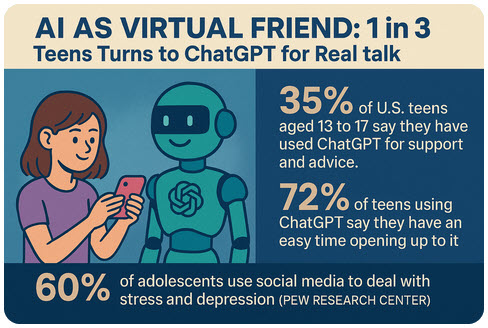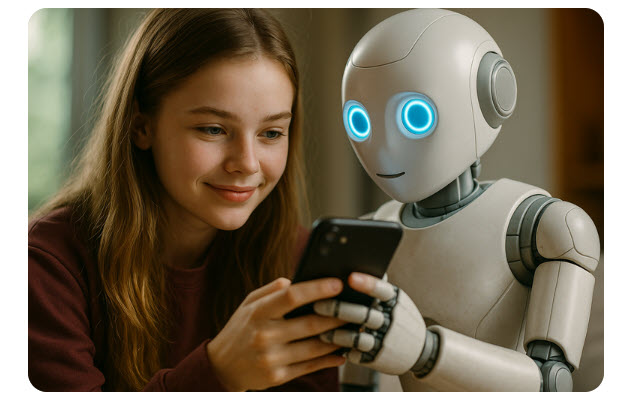What happens when the most popular teen “friend” isn’t human?
A growing body of research reveals that teenagers are using ChatGPT not just for homework or entertainment, but as a virtual confidant. New data shows that 1 in 3 teens in the U.S. already turn to ChatGPT for real conversations, advice, and emotional support, with 13% using it daily.
This trend is raising important questions: Are teens forming bonds with AI the same way they do with friends? And what does it mean for education, parenting, and mental health?
Table of Contents
The Data: Teens Are Talking to ChatGPT like A LOT

Recent surveys show:
- 33% of teens say they use ChatGPT for social interaction, not just tasks.
- 13% report daily use of AI chatbots for emotional check-ins or casual conversation.
- 72% of teens overall report at least some use of AI companions like ChatGPT or Replika (Teen Vogue).
This is not just a fringe behavior. It is fast becoming mainstream.
Why Teens Turn to AI for Friendship
When researchers at the University of Washington studied youth engagement with chatbots, they found teens cited “judgment-free listening” and 24/7 availability as primary reasons for preferring AI companions over peers in certain situations.
Other studies support this:
- A Pew Research Center survey found that 19% of teens have used AI to talk about stress, anxiety, or school pressures (Pew Research).
- MIT Media Lab experiments show users working with AI exhibit lower neural engagement, meaning conversations may feel easier but leave weaker emotional recall.
Together, the picture is clear: teens see AI not only as a study aid but as a low-friction, emotionally available “friend.”
Why This Friendship Might Be Different
Unlike social media, where peer judgment is constant, AI “friendship” creates one-sided, low-pressure interactions. This could lead to two unexpected outcomes:
- Reduced Social Risk: teens practice conversations, rehearse emotions, and explore identity without fear of embarrassment.
- Weaker Social Resilience: if too much emotional reliance shifts to AI, real-world social conflict and repair skills may erode.
This duality (AI as safe practice ground vs. AI as social crutch) is what makes this trend so compelling and concerning.
Why This Matters for Parents, Educators, and Policymakers
- For Parents: know that your teen may already be leaning on AI for advice—sometimes before talking to you.
- For Educators: AI companions blur the line between learning aids and emotional support systems. Classroom norms may need to adapt.
- For Mental Health Professionals: a new category of “AI-mediated relationships” is emerging that may require updated frameworks for counseling and digital wellbeing.


